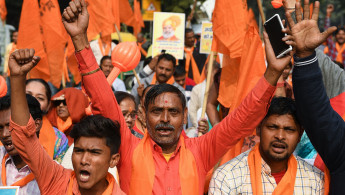Indian Supreme Court says Hindu temple should be built at site of destroyed Babri Mosque
The dispute over the ownership of the site of the mosque has been one of the country's most contentious issues, with Hindu nationalists demanding a temple for more than a century.
Prime Minister Narendra Modi hailed the court verdict and said that it has settled a long-standing matter. "Every point of view was given adequate time and opportunity to express differing points of view. This verdict will further increase people's faith in judicial processes," he tweeted.
Modi had promised to build the temple in 2014 elections that brought him to power.
Read more: Hindu students protest appointment of Muslim professor
The 16th-century Babri Mosque in northern Indian town of Ayodhya in Uttar Pradesh state was destroyed by Hindu extremists in December 1992, sparking massive Hindu-Muslim riots that killed 2,000 people, mostly Muslims.
The verdict paves the way for building the temple in place of the demolished mosque.
Five Supreme Court justices said in a unanimous judgment that 5 acres (2.02 hectares) of land will be allotted to the Muslim community at a prominent place for building a mosque. The disputed land will be given to a board of trustees for the construction of a temple dedicated to Hindu god Ram.
The court observed that the demolition of the mosque in 1992 was "in violation of the status quo orders of this court." But the justices left it at that and didn't order any punitive action against those who demolished the mosque in the presence of several top leaders of Modi's party.
Twitter Post
|
Hindu supporters and activists celebrated the ruling on the court lawns, blowing bugles and chanting "Jai Shree Ram," or hail god Ram.
Zafaryab Jilani, the attorney representing the Muslims, opposed the ruling.
"We are not satisfied with the verdict and it's not up to our expectation," said Jilani, who is representing the Muslim community's Babri Action committee.
"These 5 acres of land don't mean anything to us," he said. "We are examining the verdict and whatever legal course is open for us."
He hinted at filing a review petition in the Supreme Court challenging Saturday's verdict. At the same time, he appealed to members of all communities to maintain peace.
Vishnu Shankar Jain, an attorney who represented the Hindu community, said the journey over several years had been a struggle.
"It was a huge legal battle and we are happy that we convinced the Supreme Court. It's a historic moment for Hindus," he said.
Raj Nath Singh, India's defence minister, appealed to all to "accept the court verdict and maintain peace."
In Islamabad, Pakistan's foreign minister, Shah Mahmood Qureshi, criticized the verdict, saying it was indicative of the "hate based mindset" of the Prime Minister Narendra Modi's government.
"This is nothing but Modi's government continued policies of cultivating seeds of hatred and promoting differences between the communities and religious segments of the population to achieve its designs," he said.
Indian authorities increased security in Ayodhya, 550 kilometers (350 miles) east of New Delhi, and deployed more than 5,000 paramilitary forces to prevent any attacks by Hindu activists on Muslims, who comprise 6 percent of the town's more than 55,500 people.
Overall, Hindus comprise more than 80 percent and Muslims nearly 14 percent of India's 1.3 billion people.
The strict measures included a ban on the assembly of more than four people at one place.
The town looked deserted with authorities turning back thousands of Hindu pilgrims who were congregating for a religious event on Tuesday. Security forces also established a strong presence around the religious site and were not allowing anyone to visit.
Police have also arrested nearly 500 people for posting provocative messages on social media in the state.
Follow us on Twitter: @The_NewArab





 Follow the Middle East's top stories in English at The New Arab on Google News
Follow the Middle East's top stories in English at The New Arab on Google News


